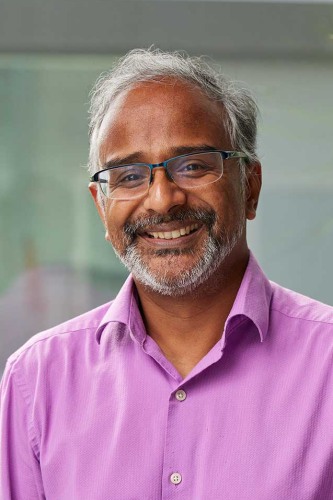A minute with Suresh Venkatasubramanian
Spend a minute with Suresh to learn about his start in computational geometry, current projects in technological responsibility, and love of coffee.
Tell us a bit about who you are and what you do at DSI.
I'm Suresh Venkatasubramanian, and I direct the Center for Technological Responsibility, Reimagination, and Redesign (CNTR) here at DSI. I'm a professor of Computer Science and Data Science. I've been here somewhere between two and three years, depending on how you count.
How did you become interested in data science and focused on tech responsibility?
I started off in computer science doing something called computational geometry, which is basically designing algorithms to work with geometrical objects: points, lines, things like that. The dimensions of the things I was studying got bigger and bigger, until I was dealing with what is called high dimensional geometry–where all data lives. If you have data about people, you can think of it as living in a high dimensional geometric space.
So through the study of geometry, I got to the study of data. I got to thinking about machine learning, data mining, etc. And then I started thinking about what comes next: what happens when you can do machine learning on everything?
That's when it became clear to me that one of the questions we're going to be worrying about in the future is accountability and trust. How do we trust that these systems are doing what they claim to be doing?
I’ve been wanting to build something like the CNTR for a while. The mission of the Center is to imagine a better future where we can build tech that actually works for us and meets all of our needs, including many of us who have traditionally been ignored by technology. The CNTR aims to make sure we can provide that positive vision of the world.
So what does your and your students’ research focus on now?
We research a lot of different things, but one common thread in all of them is thinking about what happens when tech clashes with people, sometimes violently, and identifying the issues that come up.
One example is a project that we're working on right now with Sohini Ramachandran and her students. What do we do about the way our genetic data is collected, used, and transferred? Do we have adequate protections in place so that our data can’t be misused? Do we even understand what kind of information can be extracted from DNA and what can’t?
This is an example of a project where technology–genetic data sampling–is colliding with people. We’re trying to gain a better understanding of the algorithms that collect genetic data and make inferences from it. We’re making recommendations of how we should put governance policy regulations on top of this.
With regard to the future, I have no idea what I’ll be working on in 10 years. I have no idea what's gonna happen next week; the field changes so rapidly. A lot of what I'm doing is just seeing where technology and society are and trying to react in real time. The questions will mutate and change, and that's what makes it interesting.
What do you envision for the future of DSI?
I think DSI plays a very unique role at Brown. There's a whole world of research out there that collects data and tries to extract knowledge. Data science is done everywhere, not just in computer science, not just in biostats, but in all these places: economics, sociology, the humanities, etc.
I think DSI plays the role of a focal point, saying, “Come here; we have people who talk about data in all these different ways and with different methodologies. We understand how you can extract knowledge from data, and when you can’t. We are a place where you can come with your questions and find a community of people asking the same questions as you”
That’s what DSI represents: a hub for data science, a central clearinghouse. A place where we can come together and think about questions and then bring that knowledge back to our own disciplines. This is the role of an institute, of a Center, and I think that’s what we do.
What do you like to do for fun outside of work?
Sorry, what do you mean? What is “outside of work”? I’m joking, I shouldn’t say this; my students give me grief over this.
I love to drink coffee. People know me as a coffee obsessed person. If anyone ever wants to get a hold of me, all they have to say is “let's go get coffee,” and I'll go even if I've just come back from a previous coffee.
I have one rule in life. It's always time for more coffee.
